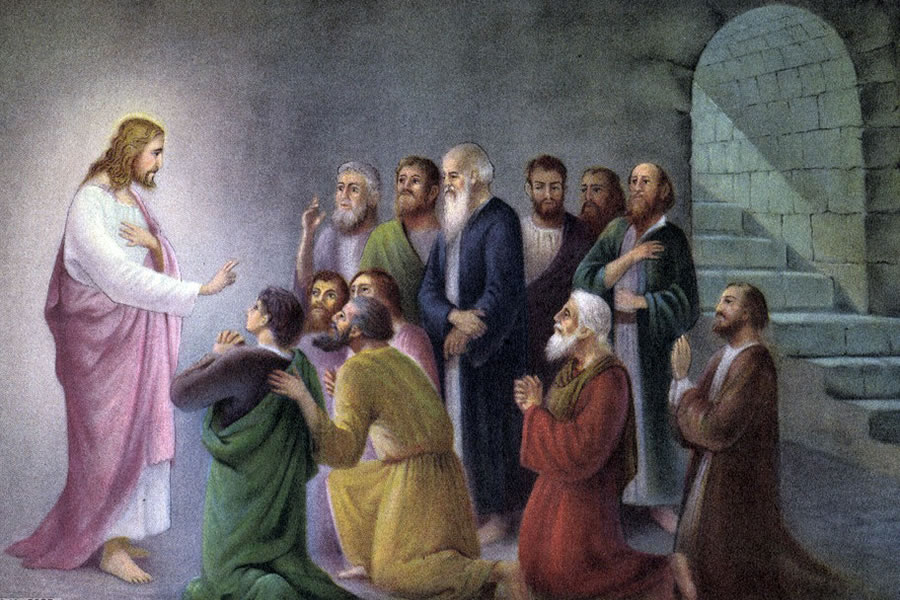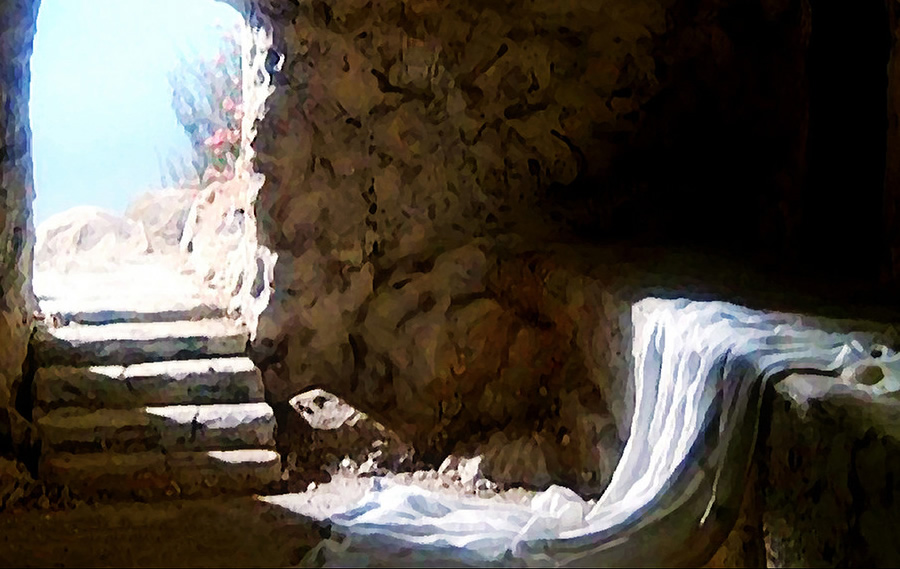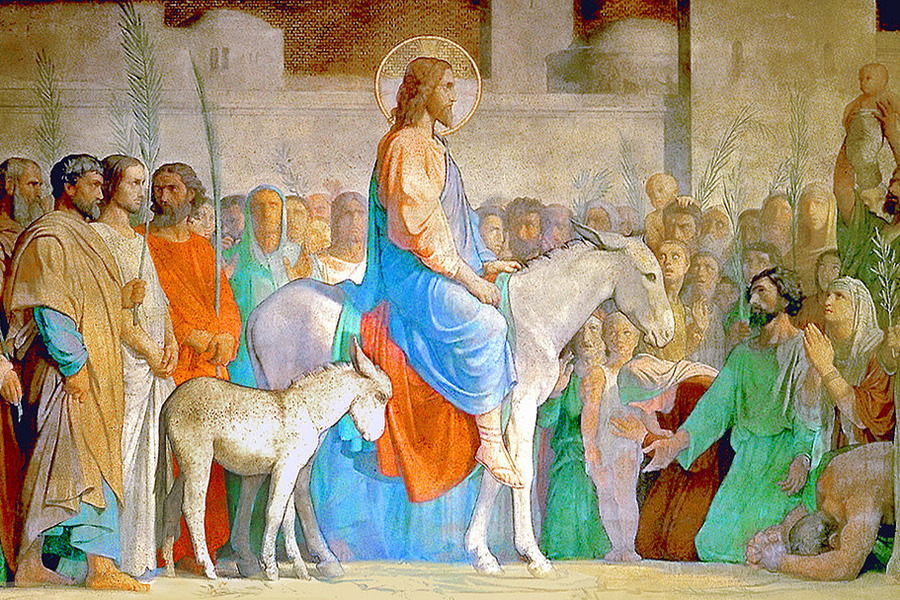St. Francis of Assisi Weekly Reflections

Do you also need to See and Touch like Thomas?
04-28-2019Weekly ReflectionWe Celebrate Worship Resource, Vol. 44, No. 2It’s hard to beat eyewitness testimony, especially testimony from multiple eyewitnesses, and people whom you can trust, to boot. It was not enough for Thomas, though. He needed to see. He needed to touch. So the following week he makes sure to be there. Jesus, returning to the Twelve, does not reprimand Thomas; in fact, he invites him to prove it to himself. But then he praises those who believe without seeing, without witnessing firsthand, without being able to prove it. These are the “great numbers of men and women” in the first reading, who come to believe when they see the faith and hear the testimony of disciples like Peter (Acts 5:14). These are the ones who will hear Johns’ visions from Revelation, which Jesus insisted he write down. These are also the people seated around you today, men and women, young and old, who gather in Jesus’ name each week. Though it may be two thousand years later, we too are the ones for whom the testimony of the disciples, the evangelists, the visionaries, and the letter writes was meant. Now, in turn, we are those witnesses—witnessing to our faith in the risen Lord, here and now, when we gather in this sacrament, in his Body and Blood, in Word and Eucharist.
How can you bear witness to others?
READ MORELiving Without Fear
04-28-2019Question of the WeekReading I Acts 5:12-16 - Signs and wonders
Reading II Revelation 1:9-11a, 12-13, 17-19 - First vision
Gospel John 20:19-31 - Appearance to the disciples; Thomas
Key Passage He placed his right hand on me, saying, “Do not be afraid; I am the first and the last, and the living one. I was dead, and see, I am alive forever and ever.” (Revelation 1:17b.18a)
Adults: When has your faith in the living Christ helped you overcome fear?
Kids: What could you do this Easter season to help someone feel less afraid?
READ MORE
He had to Rise from the Dead
04-21-2019Weekly ReflectionWe Celebrate Worship Resource, Vol. 44, No. 2Resurrection changes everything. It stunned the disciples. Mary Magdalene, Peter, the disciple whom Jesus loved, the other apostles—they were all surprised, “for they did not understand the Scripture that he had to rise from the dead” (John 20:9). Keep in mind that Jesus’ disciples did not write letters, or testimonies, or Gospels until years later. What we hear today was written well after they had encountered the risen Lord in one way or another. It was also after they realized that Jesus had prepared them for his resurrection well before they had come to Jerusalem. That first Easter morning, they were not expecting this. This mission that appeared to have ended in failure had been turned upside down. The tomb was empty. Jesus could not be contained in this place for the deceased. He had defeated death. He lives! And because he lives, we who have been baptized into his death live as well. This is why Paul tells the Colossians to seek what is above. This is why Paul tells the Corinthians to throw out the old yeast and bake a fresh batch of dough. Jesus is new yeast and we are new dough. With Christ in us, we shall rise as well. This is our Easter hope. This is our Easter joy.
How does the Easter message change the way you live your life?
READ MOREMade New by Christ
04-21-2019Question of the WeekReading I Acts 10:34a, 37-43 - Peter's discourse
Reading II Colossians 3:1-4 - Mystical death and resurrection
Gospel John 20:1-9 - Peter and the disciple at the tomb
Key Passage Clean out the old yeast so that you may be a new batch, as you really are unleavened. For our paschal lamb, Christ, has been sacrificed. (1 Corinthians 5:7)
Adults: What change could the hope of the resurrection of Christ inspire you to make?
Kids: What bad habit would you like to “clear out” during the hopeful time of this Easter season?
READ MOREWhy do we Renew our Baptismal Promises?
04-21-2019Liturgy CornerMarlon De La Torre, MA, MEd. and Stephen BealeBaptism is a crucially important sacrament. It’s the only sacrament mentioned explicitly in the Nicene Creed. Christ’s specially appointed forerunner was John the Baptist. And the first thing Christ did in His public ministry was to get baptized. Our human identity is intimately linked to the sacrament of Baptism. This may come as a surprise to some but the reality of our existence is intertwined to this first sacrament of initiation because it provides us with a rebirth as sons and daughters of God. The solemn significance of baptism is underscored by the fact that it can only be done once and is irreversible. As the Catechism of the Catholic Church puts it, “Baptism seals the Christian with the indelible spiritual mark (character) of his belonging to Christ. No sin can erase this mark, even if sin prevents Baptism from bearing the fruits of salvation. Given once for all, baptism cannot be repeated.”
READ MORELove and Betrayal
04-14-2019Question of the WeekReading I Luke 19:28-40 - Welcomed with palms
Reading II Isaiah 50:4-7 - Salvation only through the Lord's servant
Gospel Philippians 2:6-11 - Jesus, compassionate high priest
Key Passage The Lord turned and looked at Peter. Then Peter remembered the word of the Lord, how he had said to him, “Before the cock crows today, you will deny me three times.” (Luke 22:61)
Adults: When have you felt that you betrayed the confidence of another, as Peter did when he denied Jesus?
Kids: When have you let someone down who trusted you? How did you feel?
READ MORE
Jesus Teaches Us Compassion
04-14-2019Weekly ReflectionWe Celebrate Worship Resource, Vol. 44, No. 2He had to have heard him. Even on the cross, his last breath just hours away, Jesus heard the criminal next to him when he addressed him, so he must have heard him when he’d said to the other criminal, “We have been condemned justly, for the sentence we received corresponds to our crimes” (Luke 23:41). He makes no pretense of innocence. He makes no excuse for his sentence, so his crime must have been particularly heinous. But now, hours away from death himself, he addresses Jesus with one thing, one thing only: “Jesus, remember me when you come into your kingdom” (23:42). Jesus, who throughout his Passion had acted with boundless compassion (“compassion” literally meaning “to suffer”), praying that Peter’s faith not fail (22:32), praying that disciples not suffer (22:40), healing the high priest’s servant’s ear (22:51), comforting the women who accompanied him (23:28), and asking forgiveness of those who condemned him (23:24), now assures this criminal, this criminal whom he has heard admit that he was condemned justly and sentenced appropriately, “Amen, I say to you, today you will be with me in Paradise” (23:43). What consolation it must give us to know the extent of Jesus’ compassion.
Follow the example of Jesus, how can you be compassionate even while you are suffering?
READ MOREThe Meaning of "Hosanna"
04-14-2019Liturgy CornerFr. Paul Turner, © Resource Publications, Inc.In today’s Palm Sunday Liturgy, we start with the Opening Antiphon of “Hosanna to the Son of David…”. Also, in every Liturgy of the Eucharist, we say or sing “Hosanna in the highest…” during the Holy, Holy in the Eucharistic Prayer. Even though we say it every week or every day, do we know what it means? The word’s origin comes from a Hebrew phrase for an exclamation of praise, especially for Jewish festivals, such as Passover.
The word Christians use today is the Greeks’ creation. They used Greek letters to create the pronunciation of a Hebrew phrase: hoshiya na, meaning, “Save, please!” The word “hosanna” came in liturgical usage to serve as an expression of joy and praise for deliverance granted or anticipated. When Jesus came to Jerusalem for his final presentation of himself to Israel, the expression came readily to the lips of the Passover crowds.
READ MOREFalse Pride
04-07-2019Question of the WeekReading I Isaiah 43:16-21 - Promise of restoration
Reading II Philippians 3:8-14 - Breaking with the past
Gospel John 8:1-11 - The adulteress
Key Passage Jesus straightened up and said, “Let anyone among you who is without sin be the first to throw a stone at her.” (John 8:7)
Adults: Have you ever been too willing to "cast the first stone" when you disapproved of someone's behavior? How can you resist these feelings?
Kids: When have you criticized or made fun of someone? What could help you act differently?
READ MORE
Neither Do I Condemn You
04-07-2019Weekly ReflectionWe Celebrate Worship Resource, Vol. 44, No. 1The people who gathered in the temple area that day expected to witness a stoning. The woman had been caught in adultery, so according to Moses, she deserved to be stoned. But instead they end up witnessing a dramatic act of redemption. Jesus outwits the authorities who want to trap him. When no one is left to condemn the woman, Jesus forgives her, releases her, and tell her to sin no more. She had expected to be killed, but instead she is set free. She has been brought back to life. Brought back to life like the Israelites, out of bondage and into the promised land in Moses’ time. Brought out of exile and back home, in Isaiah’s era. Brought back to life like Saint Paul, who had persecuted Christians, but now was “taken possession of by Christ” (Philippians 3:12). We come here today as sinful people. If we were judged by the worst we have done or failed to do, would we not be condemned? Yet we too are touched by God’s grace. In God’s care, in Christ’s hands, we sinners, like the adulterous woman, like the Chosen People, like Saint Paul, are redeemed. We are brought back to life.
Do Jesus’ words give you pause when you are about to cast stones?
READ MORE